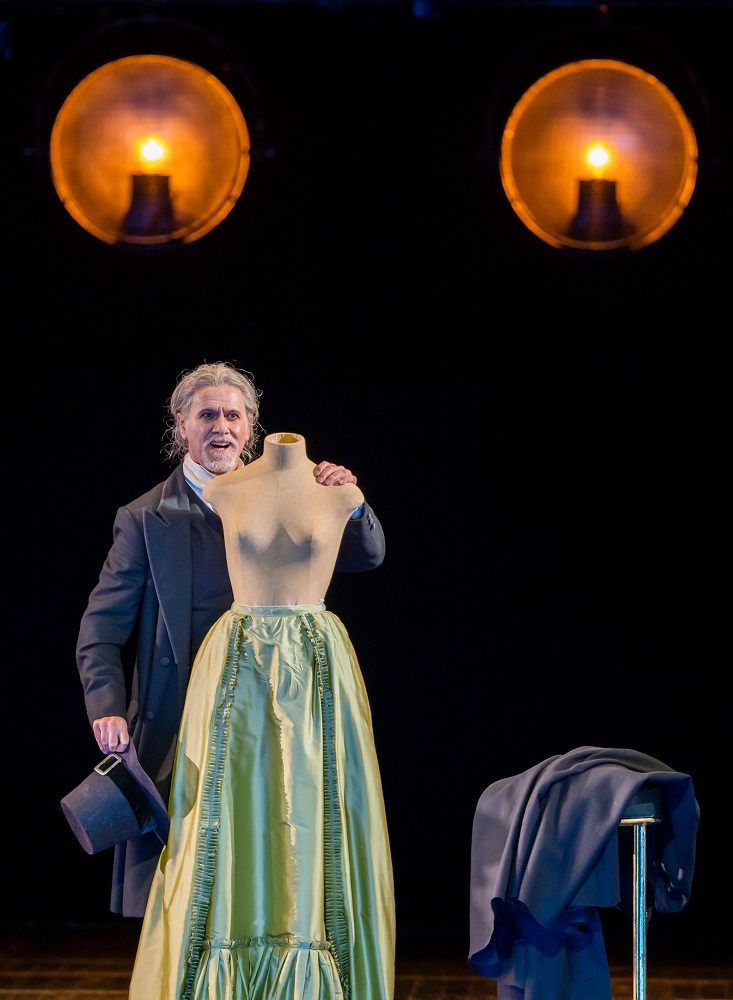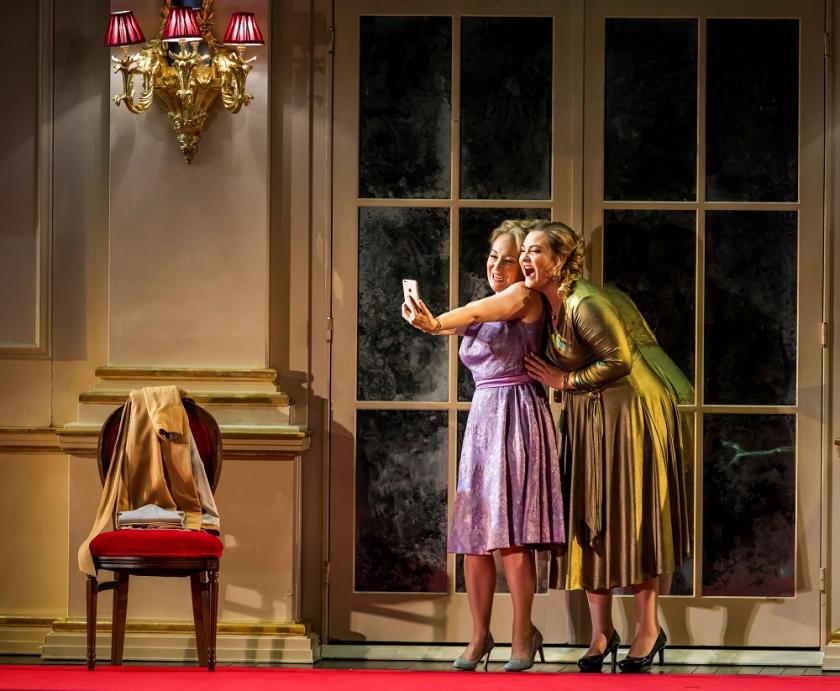Irish soprano Jennifer Davis, a stunning Elsa in this Royal Opera season's revival of Wagner’s Lohengrin, was the lure to sit through Jan Philipp Gloger's Mozart Così again (the title, by the way – "All Women Do It" – belies the complexity applied to a schematic plot). As it turned out, the mixed-up couples were all love’s young dream, which made it all the more of a shame that this production remains determined to squash their hopes and even their new matches.
Gloger has shown us that Mozart's Dorabella, the flightier of two sisters under siege, doesn't take too long to see through barely disguised Guglielmo, acting out a role to woo his friend's girl and win a wage – more than a fake moustache gets removed in the course of their genuinely sexy Act Two duet. Maybe Fiordiligi knows exactly who Ferrando is, too; difficult to tell as the all-the-world’s-a-stage imbroglio isn’t realistic. So any “revelations” weren’t any fun, and predictably the attempts of manipulators Don Alfonso and Despina to reunite their more-than-playthings wouldn’t work; it might be a real surprise to see a Così these days where there was something like a happy ending, at least in terms of a jolly moral-pointing.
I wonder, too, if a refreshingly young and diverse Royal Opera House audience – what special offer occasioned this pleasant surprise, the best possible answer to Raab's ignorance? – wasn’t flagging at the end of what must feel like a very long first operatic experience; earlier it was so wonderful for jaded old Mozart hands to hear such surprised laughter at the familiar gags. But ultimately Gloger didn’t help.  Still, though they don't really trust the six leads enough, Ben Bauer's lavish set designs and scene-changes, complete with too many extras, can look very handsome – especially the classical stage-within-a-stage of trees painted on flats to initiate the men’s renewed, and ultimately more serious, wooing in Act Two. The joy of the casting this time is that the young pairs not only blend beautifully in ensembles but show exactly the kind of vocally burnished individuality needed in the arias. (Pictured above: Bogdan Volkov's Ferrando and Gordon Bintner's Guglielmo with Serena Gamberoni's Despina)
Still, though they don't really trust the six leads enough, Ben Bauer's lavish set designs and scene-changes, complete with too many extras, can look very handsome – especially the classical stage-within-a-stage of trees painted on flats to initiate the men’s renewed, and ultimately more serious, wooing in Act Two. The joy of the casting this time is that the young pairs not only blend beautifully in ensembles but show exactly the kind of vocally burnished individuality needed in the arias. (Pictured above: Bogdan Volkov's Ferrando and Gordon Bintner's Guglielmo with Serena Gamberoni's Despina)
On the first night, Davis had a few under-the-note problems up top – it can’t be easy balancing full-voiced Wagner and the subtler side of Mozart – and the fireworks of “Come scoglio” came off better than some of “Per pieta”, though its quiet phrases just before the end were melting. Throughout she produced the glorious, youthful, vibrant sound we’re learning to treasure. Her runs and ornamentations remain agile and stylish; musicality is matched to warmest sympathy.
 Julie Boulianne’s Dorabella provided the perfect contrast – blending when necessary but pulling out lustrous mezzo stops when appropriate (including a perfectly licensed full top note in the Act 2 aria). This Dorabella was clearly in danger from the tall, wolfish personage of this handsome Guglielmo, Gordon Bintner, who like the lighter, most Mozartian singer in the line-up, tenor Bogdan Volkov, phrased with amplitude and intelligence; coaching must have been good in rehearsals, because everyone knows exactly how to get the right musical effects, and Julia Jones’s buoyant conducting, mostly perfect in choice of fleet but not rushed tempi, seemed well tuned to her singers, even if last night there were a few out-of-syncs – sure it will settle.
Julie Boulianne’s Dorabella provided the perfect contrast – blending when necessary but pulling out lustrous mezzo stops when appropriate (including a perfectly licensed full top note in the Act 2 aria). This Dorabella was clearly in danger from the tall, wolfish personage of this handsome Guglielmo, Gordon Bintner, who like the lighter, most Mozartian singer in the line-up, tenor Bogdan Volkov, phrased with amplitude and intelligence; coaching must have been good in rehearsals, because everyone knows exactly how to get the right musical effects, and Julia Jones’s buoyant conducting, mostly perfect in choice of fleet but not rushed tempi, seemed well tuned to her singers, even if last night there were a few out-of-syncs – sure it will settle.
The largesse of big Verdi baritone Lucio Gallo as Don Alfonso (pictured above) gilded the proceedings, and if Serena Gamberoni's Despina inclined to the generic, her sense of fun and dance moves worked well. It didn’t help her smaller voice, though, that so much of the action is set back behind a second proscenium arch on stage; more of it needs to be further forward. Otherwise, a classy cast make the most of a flawed but not unfocused production: for them, it's well worth seeing this time around.














Add comment